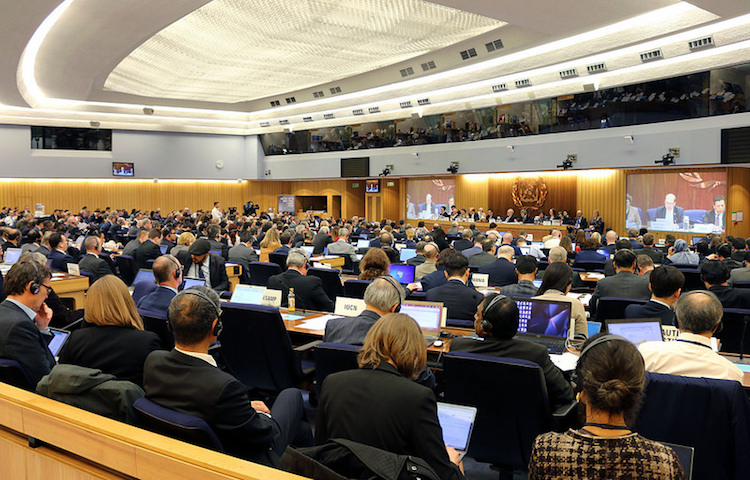By J Nastranis
NEW YORK (IDN) – More than 100 member states of the United Nations International Maritime Organization (IMO) have adopted an initial strategy to reduce greenhouse gas (GHG) emissions from international shipping and, as a matter of urgency, phasing them out.
The plan adopted by IMO’s Marine Environment Protection Committee (MEPC) during its 72nd session at the organization’s headquarters in London on April 13, includes a specific reference to “a pathway of CO2 emissions reduction consistent with the Paris Agreement temperature goals”.
The Paris Agreement’s central aim is to strengthen the global response to the threat of climate change by keeping a global temperature rise this century well below 2 degrees Celsius above pre-industrial levels and to pursue efforts to limit the temperature increase even further to 1.5 degrees Celsius.
The initial strategy identifies levels of ambition for the international shipping sector noting that technological innovation and the global introduction of alternative fuels and/or energy sources for international shipping will be integral to achieve the overall ambition.
Reviews would take into account updated emission estimates, emissions reduction options for international shipping, and the reports of the Intergovernmental Panel on Climate Change (IPCC).
Levels of ambition directing the initial strategy adopted are:
1: Carbon intensity of the ship to decrease through implementation of further phases of the energy efficiency design index (EEDI) for new ships to review with the aim to strengthen the energy efficiency design requirements for ships with the percentage improvement for each phase to be determined for each ship type, as appropriate;
2: Carbon intensity of international shipping to drop to reduce CO2 emissions per transport work, as an average across international shipping, by at least 40% by 2030, pursuing efforts towards 70% by 2050, compared to 2008; and
3: GHG emissions from international shipping to peak and decline to peak GHG emissions from international shipping as soon as possible and to reduce the total annual GHG emissions by at least 50% by 2050 compared to 2008 whilst pursuing efforts towards phasing them out as called for in the Vision as a point on a pathway of CO2 emissions reduction consistent with the Paris Agreement temperature goals.
IMO Secretary-General Kitack Lim said the adoption of the strategy was another successful illustration of the renowned IMO spirit of cooperation and would allow future IMO work on climate change to be rooted in a solid basis.
“While it’s good to see some progress in the shipping sector, science tells us that the 50% emissions reduction target … does not go far enough to meet the goals of the Paris Agreement,” commented Dexter Galvin, Global Director, Corporates & Supply Chain at CDP, the largest source of global corporate environmental data.
However, Galvin added, this does not stop individual companies taking the lead and getting ahead of tougher targets which are likely to be set in the years to come. The CDP’s work with leading purchasing organisations shows us that the customers of shipping companies are increasingly demanding action and transparency from their suppliers, he added.
“By setting ambitious goals to reduce their emissions, and reporting them to their customers, shipping companies can ensure their businesses are resilient and seize a competitive advantage in the future,” Galvin said. “IMO strategy aside, as the world undergoes a transition to a low-carbon economy, it’s plain to see that reducing emissions in line with a 2 degree goal is ultimately the right thing to do for their businesses,” he added.
In any case, IMO’s contribution to the global efforts to address climate change features prominently in organisation’s strategic plan. In 2011, IMO became the first international body to adopt mandatory energy-efficiency measures for an entire industry sector with a set of technical and operational requirements for new and existing vessels that entered into force in 2013. By 2025 new ships built will be 30% more energy efficient than those built in 2014.
The mandatory data collection system for fuel oil consumption of ships, which entered into force in March 2018, will provide robust data and information on which future decisions on additional measures, over and above those already adopted, can be made.
The mandatory data collection system is intended to be the first in a three-step approach in which analysis of the data collected will provide the basis for an objective, transparent and inclusive policy debate in the MEPC, under a roadmap (through to 2023) for developing a ‘Comprehensive IMO strategy on reduction of GHG emissions from ships’. The roadmap was agreed in 2016.
Support for implementation of IMO’s energy-efficiency measures is provided, in particular, through two major global projects executed by IMO: The Global Maritime Energy Efficiency Partnerships Project (GloMEEP Project) and The global maritime technology network (GMN) project.
The GloMEEP Project aims at supporting the uptake and implementation of energy efficiency measures for shipping, thereby reducing greenhouse gas emissions from shipping. It was launched in 2015 in collaboration with the Global Environment Facility (GEF) and the United Nations Development Programme (UNDP).
A Global Industry Alliance to Support Low Carbon Shipping (or GIA), launched in 2017 under the auspices of the GloMEEP Project, is identifying and developing solutions that can support overcoming barriers to the uptake of energy efficiency technologies and operational measures in the shipping sector. Website:
The GMN project, funded by the European Union, has established a network of five Maritime Technology Cooperation Centres (MTCCs) in Africa, Asia, the Caribbean, Latin America and the Pacific.
Through collaboration and outreach activities at regional level, the MTCCs will focus their efforts during 2018 and beyond to help countries develop national maritime energy-efficiency policies and measures, promote the uptake of low-carbon technologies and operations in maritime transport and establish voluntary pilot data-collection and reporting systems. [IDN-InDepthNews – 14 April 2018]
Photo: IMO’s Marine Environment Protection Committee (MEPC) during its 72nd session at the organization’s headquarters in London. Credit: UNIMO.
IDN is the flagship agency of the International Press Syndicate
Facebook.com/IDN.GoingDeeper – twitter.com/InDepthNews

